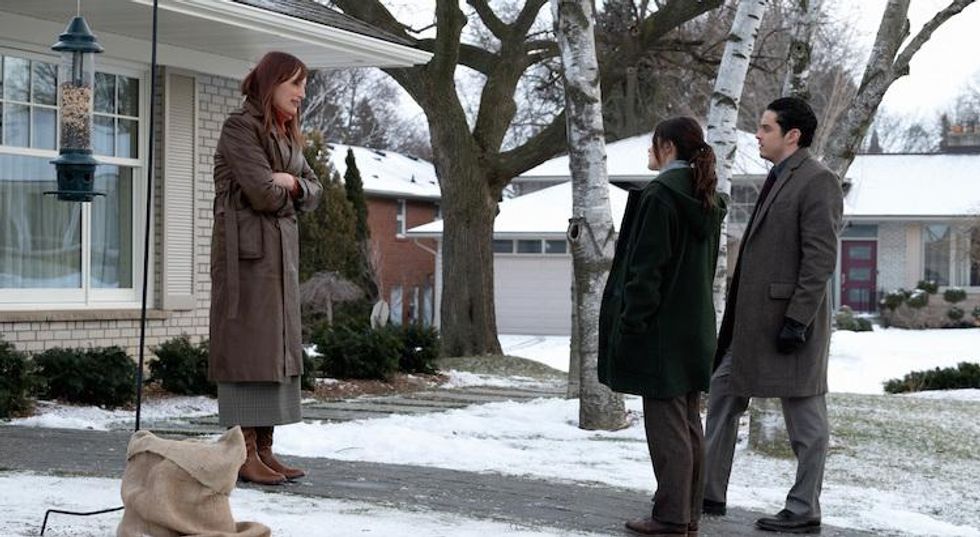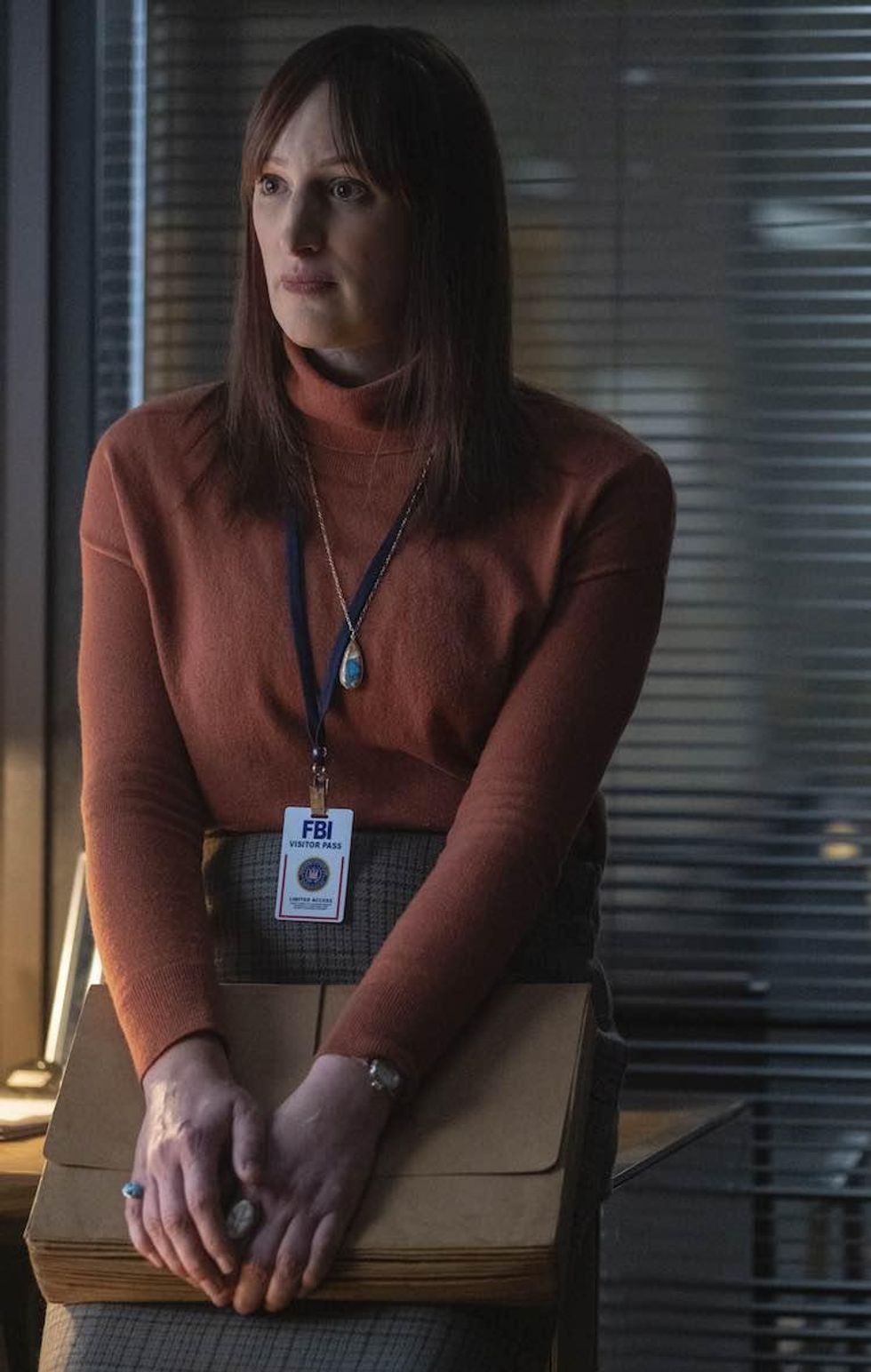Thirty years ago, The Silence of the Lambs was released, creating a sensation for several reasons. The following year, it swept the five major categories at the 1992 Academy Awards while queer activists protested in droves outside the venue over its depiction of its serial killer Buffalo Bill/Jame Gumb. Now the CBS series Clarice has introduced a storyline featuring trans actress Jen Richards (also a consultant on the show) to counter and reframe the dangerous narrative that painted Buffalo Bill as "transsexual," although "not a real transsexual," Anthony Hopkins's Hannibal Lecter tells Jodie Foster's Clarice Starling in the film.
With Richards and trans writer Eleanor Jean on board, the story, which occurs in the '90s not long after Clarice has finished the Buffalo Bill case, gives voice to trans people who were scapegoated, villainized, and left out of the discussion three decades ago.
"Trans people are only murderers or victims. It creates this binary where in which you're defined by violence either way. That's hard not to internalize, and then it takes a lot of work to overcome," Richard's tells The Advocate. "That [probably] more than anything else, is the reason I was excited to do Clarice. Because that's a big challenge to address that kind of legacy and to overcome it."
"There's some kind of magical media alchemy transmuting to something positive and affirming that shows different possibilities," she adds.
Defenders of The Silence of the Lambs will point to that single line from Lecter to Clarice in which he states that the film's serial killer Buffalo Bill (Ted Levine), who's collecting women to make a dress out of their skin, isn't in fact a "transsexual." But the twisted imagery of Buffalo Bill posing in the mirror in feminine garb while his captive Catherine Martin shrieks in a well in his basement sticks with the viewer longer than a few lines of dialogue. And it's capable of great damage.
Ultimately a fan of the film, Richards has also been acutely aware of its dangerous history since she first screened it.
"Just seeing this smart, ambitious, self-aware woman and the lead of a thriller ... one who goes toe to toe with that fantastic villain and who is the hero, a character who doesn't let herself be reduced by her womanhood or femininity," Richards says of her love of the film. "Then to see it so beautifully portrayed by Jodie Foster."
"It's just a beautiful movie too, in every way, shape, and form. Then there's just this one aspect. It's something that I think, as a trans person, I honestly suppose as any kind of marginalized person knows, it's very rare that you get to just enjoy something cleanly," Richards says.
"There's usually one or two aspects of any kind of media that kind of stabs you in the side while it's kissing you on the cheek. This is one of those movies."
Without giving too much of Clarice's plot away, it can be revealed that Richards plays Julia Lawson, an accountant with information that could aid Clarice (Rebecca Breeds) and the FBI in cracking a big case. But helping Clarice means Julia must take big risks with her job and safety. She's also currently the only breadwinner in her relationship with a woman who is undergoing treatment for cancer, so the stakes are as high as they get.
The case also puts Julia face to face with the agent (Clarice) who perpetuated the trope of the murderous transsexual in the media after the Buffalo Bill story came to light, as is explained in the series. Of course, Hollywood's horrifying depiction of trans people didn't begin with Silence. The trans-coded or cross-dressing killer predates Alfred Hitchcock's 1960 proto-slasher film Psycho (Norman Bates wasn't trans either), but it famously put that trope on the map. The dangerous stereotype was also invoked in Brian De Palma's Dressed to Kill (1980) and in the standard slasher Sleepaway Camp (1983).
Writer Jean, who was helped create the reframing narrative on Clarice, first saw Silence as a teen in a conservative part of Texas. The film's message and its popularity were warning shots that affected her deeply.
"At the time, my gender feelings were an ever-present secret -- and Buffalo Bill was yet another depiction of a transsexual person as a monster, as dangerous, and as someone to be reviled," Jean says. "I'd picked up these media signals my whole life, from devious, deceptive trans women 'tricking' men on crime shows to 'sex changes' being used as jokes on sitcoms about 'gross' people. But Silence of the Lambs was kinda on a different level -- one of the most infamous villains in films of all time was driven to heinous violence and madness from their deepest identity feelings ... feelings a lot like mine. Buffalo Bill was added to a long list of shame-filled 'warnings' to myself: 'Those feelings make you insane, so never tell them to a single soul.'"
Given the decades-long history of Hollywood equating transness with derangement, Richards, who's starred in Tales of the City and Mrs. Fletcher, was eager to come aboard as a consultant on Clarice (from creator Jenny Lumet). She first learned of the opportunity while she was camping with her wife, Rebekah Cheyne, in Sedona when GLAAD Director ofTransgender Representation Nick Adams called with the news about a Silence of the Lambs TV spin-off. The work to reframe the story, in which Julia not only says her piece to Clarice but is given space to become a hero, is a direct result of the work of the 2020 documentary Disclosure, which features dozens of trans luminaries and examines Hollywood's harmful legacy of trans storytelling.
"Essentially, the showrunner [Elizabeth Klaviter] watched the film Disclosure and realized that they wanted to address the complicated legacy of Buffalo Bill. And [they] were really committed to doing it right," Richards says.
"From the first time I met with Elizabeth, I was impressed with her, not only commitment to doing the right thing, but lack of reticence to explore the complicated aspects of the story," Richards says. "She didn't just want to do an issue of the week, make yourself feel better by having trans representation [episode]."
"Shortly into it, she just said, 'Well, why don't we just have you play the part?' Which I didn't expect, but I was thrilled to hear," she adds. "I was off to the races from there."
Klaviter, who was a co-executive producer on Grey's Anatomy and The Resident and a co-producer on Private Practice, knows the power of an image.
"Working with Jen Richards, Eleanor Jean, and Nick Adams at GLAAD to address the harmful legacy of Buffalo Bill has been both enlightening for me and profoundly rewarding," Klaviter tells The Advocate. "Story is powerful, and I can't think of a more fulfilling use of my privilege as a showrunner than to challenge harmful stereotypes."
If there were ever a question as to whether or not a piece of art could change hearts and minds, Richards says she's witnessed a shift in how Hollywood addresses trans representation and inclusion since Sam Feder's Disclosure dropped last year.
"I cannot overstate the impact that Disclosure has had specifically on Hollywood. It's like people's minds have been awakened and changed overnight -- the quality of the conversations that I have in Hollywood now...," Richards says. "Previously, I kind of took it upon myself to educate about trans representation specifically in every meeting I ever had."
But Clarice also explores aspects of trans lives that weren't addressed in the documentary. In the series, Julia does more than serve the story. She's given a full and fulfilling life independent of her gender identity.
"When we were first in the writers' room and I was talking to Elizabeth, one of the big things, and this actually doesn't come up in Disclosure because we had to cover so much ground ... but one of the mistakes that I see most frequently in trans representation is showing trans people as isolated, as alone, as not having partners and not having friends," Richards says.
She says that the most trans folks she'd ever seen on-screen on network TV to that point was three on the short-lived Laverne Cox series Doubt.
"Elizabeth's first reaction was 'Well, then we have to have four,'" Richards says. "That was her first thing -- that we have to do better."
"That kind of sums up her attitude toward all of these issues. She was really committed to doing better, and in a playful, fun, triumphant way."


















Charlie Kirk DID say stoning gay people was the 'perfect law' — and these other heinous quotes
These are some of his worst comments about LGBTQ+ people made by Charlie Kirk.